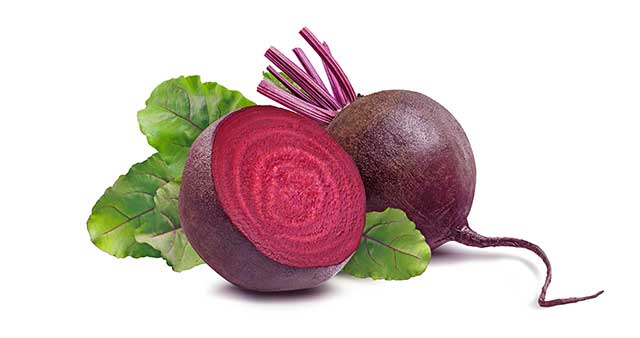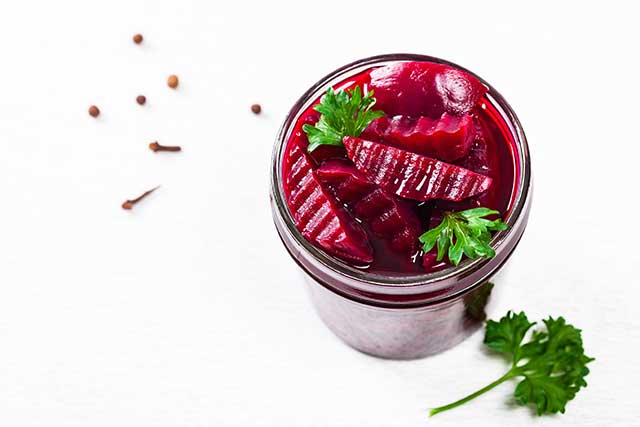Beets are a type of root vegetable that grows around the world.
This root vegetable plays a big role in the cuisine of many different countries, and beets are commonly eaten raw, cooked, pickled, and even as juice.
In this article, we examine the nutritional values of beets and take a look at the potential health benefits they may offer.

Nutrition Facts
The composition of beets is 88% water, 10% carbohydrate, and they contain minimal amounts of protein and fat.
In the table below, we can see the basic nutrition profile for beets per 100 g (3.5 oz) raw. The source is the USDA FoodData Central database (1):
| Calories/Nutrient | Amount |
|---|---|
| Calories | 43 kcal |
| Carbohydrate | 9.6 g |
| Fiber | 2.8 g |
| Sugars | 6.8 g |
| Fat | 0.2 g |
| Saturated Fat | 0.03 g |
| Monounsaturated Fat | 0.03 g |
| Polyunsaturated Fat | 0.06 g |
| Protein | 1.6 g |
Vitamins
- Folate: 77 % DV
- Vitamin C: 15.4 % DV
- Vitamin B6: 11.2 % DV
- Pantothenic acid: 8.8 % DV
- Riboflavin: 8.5 % DV
- Thiamin: 7.5 % DV
- Niacin: 5.9 % DV
- Choline: 3.1 % DV
- Vitamin E: 0.7 % DV
- Vitamin K1: 0.5 % DV
- Vitamin A: 0.5 % DV
Beets are a good source of vitamin C and folate, and they contain a small to moderate amount of most vitamins.
Minerals
- Manganese: 40.0 % DV
- Potassium: 19.5 % DV
- Magnesium: 15.5 % DV
- Iron: 12.6 % DV
- Phosphorus: 9.0 %
- Copper: 23.3 % DV
- Sodium: 9.6 % DV
- Zinc: 9.0 % DV
- Calcium: 3.5 % DV
- Selenium: 3.6 % DV
As shown in this minerals list, beets are an excellent source of manganese, potassium, magnesium, and iron.
Potential Benefits
Beets contain several interesting compounds, and this makes them one of the most well-researched vegetables.
Here is an overview of the existing research on the potential health benefits of beets.
Beets Are High In Nitrate
First of all, beets are one of the most significant dietary sources of nitrate. A typical 100-gram serving of beets provides 495 mg of nitrate (2).
Nitrate is a compound that converts to nitric oxide within the human body. This conversion starts in the oral cavity and continues in the acidic environment of the stomach (3).
Notably, nitric oxide appears to have several benefits for human health.
For example, clinical trials have demonstrated that nitrate intake improves several markers of cardiovascular health, including endothelial function, blood pressure, and platelet function (4).
Beets May Enhance Exercise Endurance
A range of research suggests that beets may have benefits for physical performance and endurance.
In one double-blind crossover study, beetroot intake appeared to improve performance. The participants undertook a 5-km time trial using a treadmill on two separate occasions after randomly consuming either 200 grams of beetroot or a placebo of cranberry relish.
Interestingly, participants completed the time trial after beetroot intake in a shorter time. During the late stages of the time trial, running velocity was 5% faster after consuming beets. Participants also reported lower levels of perceived exertion in the run after beet consumption compared to placebo (5).
A further study tested the effects of supplementing with nitrate-rich beetroot juice for 15 days in elite middle and long-distance runners. Compared to a placebo group, the beet juice participants had significantly increased ‘time to exhaustion’ and decreased perceived exertion (6).
However, one weakness with these studies was that had relatively small sample sizes and only featured 10-15 participants. More extensive trials would provide more reliable and conclusive outcomes.
That said, there is a suitable mechanism to explain how beets may improve exercise performance.
As mentioned, beets are one of the largest dietary sources of nitrate, and research shows that exercise depletes our nitric oxide stores by as much as 54%. Nitric oxide also enhances blood flow, which should raise oxygen levels in the body, thereby aiding physical performance (7, 8).
May Help To Lower Blood Pressure
Since beets increase nitric oxide levels, it is also reasonable to consider that they might have a positive impact on blood pressure.
The reason for this is because nitric oxide “relaxes” blood vessels, which dilates blood vessels and improves blood flow. The net effect of this is lower blood pressure (9).
According to several studies, beets do appear to have a beneficial effect in this regard:
- A randomized, placebo-controlled trial found that 500 grams of beetroot lowered systolic blood pressure in men by 4-5 mm Hg. These results were at a statistically significant (P<0.05) level (10).
- In a systematic review of 11 randomized controlled trials featuring 310 participants, beetroot juice decreased systolic and diastolic blood pressure in 9 of the 11 studies. The researchers theorized that this trend for reducing blood pressure was likely due to the nitrate/nitric oxide mechanism (11).
- A further systematic review and meta-analysis of 19 intervention trials demonstrated that beetroot juice had a significant impact on blood pressure levels. Across the 19 trials, beetroot juice intake led to mean decreases of 3.55 and 1.32 mm HG systolic blood pressure and diastolic blood pressure, respectively (12).
Beets Are Rich In Betalains
Betalains are a class of interesting compounds that we can find in beets. These betalains are red pigments that are responsible for the red color of the vegetable.
Beets contain two specific red pigments called betacyanin and betaxanthin. These compounds are present in beets at levels between 0.02 and 0.21%, depending on the particular cultivar (13).
In vivo (cell culture) studies show that betalains bind to LDL and inhibit LDL oxidation (14, 15, 16).
Oxidized LDL is thought to be among the main risk factors for atherosclerosis and cardiovascular disease. In this regard, higher circulating levels of oxidized LDL are significantly associated with cardiovascular disease events (17).
However, it is worth noting that reactions taking place outside of the human body do not automatically mean the same would happen in the body. At present, betalains are interesting compounds with potential benefits, but there is a relative lack of human trials on these pigments.
That said, one recent clinical trial showed that betalain supplements elevated levels of SIRT1, which is a protein thought to play a role in cardiovascular disease prevention. Additionally, the supplements also led to significant decreases in the levels of C-reactive protein, which is a marker of inflammation (18).
Potential Drawbacks
On the whole, beets are reasonably nutritious vegetables that should not cause any adverse health issues.
However, we all have different situations and food sensitivities, and certain individuals may have problems with certain compounds in food.
One compound within beets known to cause issues—in rare cases—is oxalate.
Beets Are a Significant Source of Oxalates
Oxalate, otherwise known as oxalic acid, is a naturally occurring compound that is found in various plant foods.
Most of the foods that contain it are generally quite nutritious. Additionally, the human body can also produce oxalate endogenously.
However, some research has found that excessive blood levels of oxalate may potentially promote renal inflammation in patients with chronic kidney disease (19, 20, 21).
Furthermore, according to the Department of Urology at the University of Alabama, dietary oxalate intake plays a primary role in kidney stone formation in individuals who are prone to develop them (22).
For these reasons, lowering dietary oxalate intake is considered to be a good strategy for those prone to developing kidney stones (23).
In this regard, beets are one of the most substantial dietary sources of oxalate, and they can contain anything from 36 mg to 794 mg of oxalate per 100 grams, depending on the cultivar (24).
Low-oxalate diets are generally defined as being under 50 mg oxalate per day from all sources. For this reason, beets may not be suitable for those who are following a low-oxalate diet (25, 26).
Different Ways of Eating Beets
There are several different ways in which beets can be included in the diet:
- Fresh
- Pickled
- Beet juice
Fresh Beets
As with most dietary options, fresh whole foods usually come first.
Interestingly, though, it seems that beets are one of those vegetables that many people don’t know how to use.
However, there are many different ways of eating fresh beets:
- Roast them
- Cook them in a stew
- Eat them raw
- Make them into a dip
For some ideas on how to use beets in these ways, see this list of recipes.
Raw beets have a crunchy texture, whereas cooked beets take on a slightly sweeter, softer feeling.
Pickled Beets
Pickled beets are widely available in cans and jars, and it is also straightforward to make them at home.
Aside from slightly higher sodium content, the nutritional value of pickled beets will be similar to their fresh form.
There is a useful guide on how to make pickled beets at home here.
Beet Juice
Beet juice can be an excellent way to get a convenient and concentrated source of the nutrients in fresh beets.
However, it can be relatively expensive compared to simply buying fresh vegetables.
For this reason, it may be worth preparing beet juice at home for those who have the right equipment.
As previously discussed, beet juice may have help to enhance endurance, and it enjoys popularity as a sports supplement (27).
Final Thoughts
Overall, beets are a good source of nutrients, and due to their nitrate content, they may help to improve sports performance.
Furthermore, they contain a range of compounds—such as betalains—that may have further health benefits.
That said, it is easy to come across exaggerated information on beets, and they certainly don’t warrant “superfood” descriptions.
For more on root vegetables, see this balanced review of potatoes.

